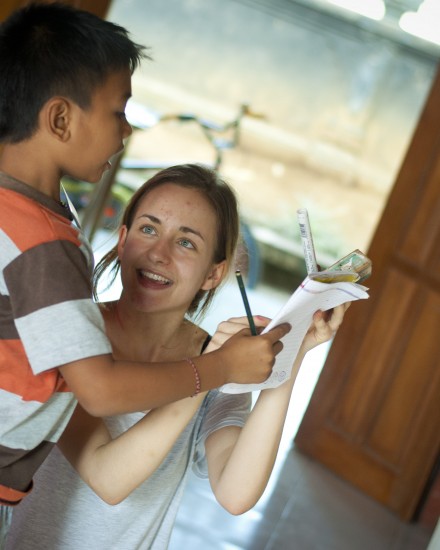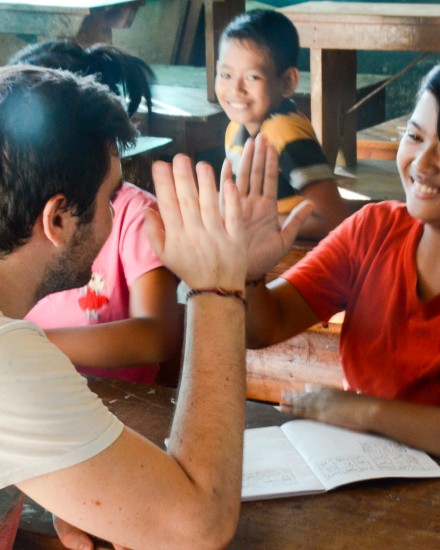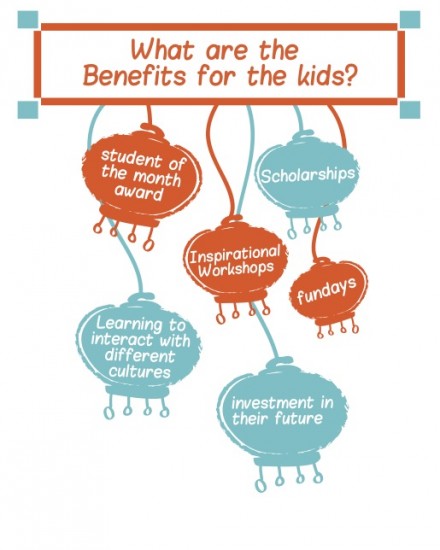About us
Why Bali?
And why is teaching English so important?
Why Bali? And why is teaching English so important?



“ Knowledge is power. Information is liberating. Education is the premise of progress, in every society, in every family. “
Kofi Annan.
Education in Indonesia is compulsory under Government Regulations for children aged 7 to 15 years old. State (public) education is free at elementary school level. However, parents must supply books, stationery, a uniform and additional funds for school outings. Education is also available in fee-paying private schools, which include religion-based schools, international schools and national-plus schools. In Bali you can find both public schools and private schools (swasta). Private schools are required to comply with national education regulations regarding the curriculum, educational calendar, teaching load and teacher quality standards.
Often parents will send their children to private schools or to additional after school education. However, sadly there are hundreds of thousands of children who never get this opportunity due to high tutor fees. These children are usually taken out of school as soon as there is a paid job available for them, so they can contribute to the family life.
The main language at schools is the Indonesian national language; Bahasa Indonesia, but local regional languages may be used in the first three years of primary school. The school year runs from mid-July to mid-June on a semester system.
Often children only follow education until Junior High School as the Senior High School is not compulsory and often too expensive for the student or family to pay for. An average of about 50% of the population between 15 and 18 years old is attending school.
| 4- 7 years old | Kindergarten; Preparation for elementary school | TK (compulsory) |
| 7- 13 years old | Primary Education | SD (compulsory) |
| 13- 15 years old | Junior High School | SMP (compulsory) |
| 16- 18 years old | Senior High School | SMA (not compulsory) |
| Older than 18 years | University | Universitas (not compulsory) |
The Indonesian education system is based on a 12-year school structure (6+3+3) followed by four years at the undergraduate level and two years at the master’s level for students pursuing non-vocational studies.
Primary Education (SD)
Junior High School (SMP)
Senior High School (SMA)
Primary Education (sekolah dasar – SD)
Primary schooling begins at the age of 6-7 years old and is compulsory for all. The six-year curriculum includes: Civics and religious education, moral education, Indonesian history, Bahasa Indonesia (national language), mathematics, science, social studies, physical education, and art.
Students graduate with the Certificate of Graduation (Surat Tanda Kelulusan – STK) after taking a school-administered final exam.
In 2010, 83.2 percent of all children in primary education were in public schools.
(Source: https://wenr.wes.org/2014/04/education-in-indonesia/)
Junior High School (Sekolah Menengah Pertama – SMP)
Junior High School is three years (grades 6-9) and compulsory for everyone. The curriculum includes: Pancasila (civics), religious education, Bahasa Indonesia, English language, mathematics, biology, chemistry, physics, economics, geography, history, art, and physical education.
Students graduate with the Certificate of Completion of Junior Secondary Education (Surat Tanda Tamat Belajar: Sekolah Menengah Pertama – STTB: SMP or Ijazah: SMP), which is issued by the school.
In addition, the Certificate of Graduation (Surat Keterangan Hasil Ujian Nasional – SKHUN) is issued to students who pass the National Examination (Ujian [Akhir] Nasional – UN/UAN) set by the Department of National Education at the end of grade 9. Students are tested in mathematics, English, Bahasa Indonesia, and sciences. Results are indicated on the certificate.
In 2010, 63.7 percent of lower secondary students were in public schools.
(Source: https://wenr.wes.org/2014/04/education-in-indonesia/)
Senior High School (Sekolah Menengah Atas – SMA)
Senior High School is three years (grades 9-12) and is not compulsory. The first-year curriculum is more generalist than the last two. Students can join either the general academic (Sekolah Menengah Atas – SMA) or vocational curriculum (Madrasah Aliyah Kejuruan – SMK) upon entry into senior secondary.
In 2010, 50.2 percent of upper secondary students were enrolled in public schools.
(Source: https://wenr.wes.org/2014/04/education-in-indonesia/)
Indonesia has been ranked last in a landmark education report in 2013 that measured literacy, test results, graduation rates and other key benchmarks in 50 nations.
Only a third of Indonesian students - in a country where 57 million attend school - complete basic schooling and the education system is plagued by poor teaching and corruption.
(source: https://www.aljazeera.com/programmes/101east/2013/02/201321965257154992.html)
In Bali, the public schools have anywhere between 2 to 4 hours of class per day, 6 days a week. The groups take shifts, either in the morning, or in the afternoon. Compared to the standard educational system in the West, the curriculum is extremely basic, and on its own not enough to provide a solid base to build on and create a problem solving mind necessary to provide a stable future for the children and next generations. Teachers more often use the rote learning methods, instead of creative and meaningful learning. Rote learning is a memorization technique based on repetition. The idea is that one will be able to quickly recall the meaning of the material the more one repeats it. Creative and meaningful learning focusses more on making learning relevant to learners and students; enabling them to take ownership of learning experiences.
A day in a student’s life in Indonesia is rather boring. Students are expected to come to school early in the morning, at around 7-8 AM, and remain at school until the afternoon, around 1-2 PM. That’s 6 hours of sitting still! Students get two breaks: one in the morning (9-10 PM) and another for lunch. In the classroom, the usual method of instruction is reminiscent of Enlightenment education: communication is mostly one-way, with the teacher explaining the lesson while students take notes. Creative learning or learning through action is often kept to a minimum, even in primary education. During class, students are often discouraged to ask questions or present a critical remark towards the teacher. This is ingrained in Eastern culture, where the teacher is a figure of authority who must be respected. The act of asking a question is deemed as an act of disrespect as if the teacher fails to answer, it may cause the teacher to “lose face”. Also, to question the teacher would also bring embarrassment to the student, implying that the student was unable to comprehend the teacher’s explanation, equally leading to “losing face”. As such, emphasis is put on memorization and the ability to answer questions “by the book”, not on critical or creative thinking. The end goal of any class is to pass the standardized exams held at the end of every semester. Standardized tests are almost always multiple-choice, like the SAT; essay-based questions are more common at university level.
So, that’s a very brief overview on how the Indonesian education system is. It is mostly concentrated on passing standardized tests, and puts very little emphasis on nurturing critical thinking faculties or creative arts. As such, we strive to provide opportunities for the students to “take a breather” and indulge in the creative arts in our classes.
The curriculum in public schools does include English language, starting at Junior High School however, as explained, the education is very basic. Since Bali has become more and more dependent on tourism, the English language is extremely important for everyone on the island. Even having a very basic knowledge of English can make the difference between living in serious poverty (no job, or extremely low wage) and working in a minimum wage sector (and of course much better than that).
At VP Bali we encourage our students not only to develop a basic knowledge of English, but also the confidence and creativity to use the language in their daily life and in their future jobs. For more information about our Teaching Program, please have a look here: “Teaching English at VP Bali”

VP Bali’s aim is to provide classes and events to inspire and empower the children of Bali.
This means that we not only give the children extra support with English classes, but also the opportunity to explore and develop skills and talents in a playful way and practice their language skills in a more meaningful way. In the English classes they are learning in a playful and creative way to speak, listen and write English, and the topics are endless. The reason why ‘play and fun’ are of central importance in our programs is because it is a free and after school activity. The children come because they enjoy the atmosphere and enjoy learning new things this way. For the children who are really motivated to continue to learn and develop but can’t afford a higher education (or are not allowed to because they need to earn money for the family), we provide scholarships and mediate to make sure they have paid internships. We are also aware that some children don’t have access to transportation or the financial resources to pay for it. VP Bali provides transport for those kids, so that they also have the chance to enjoy our free afternoon classes.
